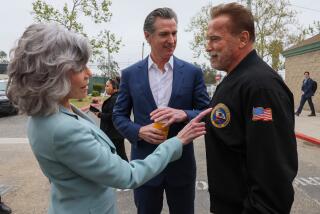TV AND THE GULF WAR : TV’s Flags and Yellow Ribbons
- Share via
How do you qualify for the Good American Seal of Approval?
A friend of mine--an ex-Marine who supports U.S. pursuit of the Persian Gulf War--was getting some gas for his car the other day when the service station attendant demanded to know why he didn’t have an American flag decal on his windshield.
My friend was taken aback. When he told the attendant he didn’t desire a flag decal on his windshield, the attendant tried to put one on anyway. They argued, with the attendant questioning my friend’s loyalty and my friend maintaining that he need not publicly display a flag or any other symbol to be patriotic.
A valid point, of course, but the kind of reasoning increasingly whooshed aside when public opinion polls show overwhelming support for the war and the powerful gale winds of flag waving howl loudly across the country.
Television is among those waving the hardest.
Newspapers and airwaves abound with criticism of media coverage of the war, most of it charging CNN and other elements of TV with either purposely or inadvertently using material that assists or encourages Iraq. That point of view undoubtedly will surface today when the Senate Committee on Governmental Affairs is scheduled to hold a hearing on Pentagon restrictions on media in the Persian Gulf.
Yet there is no evidence that TV is trashing the war.
On the contrary, much of TV has calculatingly wrapped itself in a yellow ribbon of respectability, with local newscasts such as those on KABC Channel 7 and KNBC Channel 4 incorporating the symbols of war and Americana into their logos and entertainment shows making Operation Desert Storm a continuing theme.
In the same week, for example, several daytime series featured beauty makeovers for families of troops in the Gulf, almost as if patriotic themes were being passed from show to show.
On a recent episode of “The Price is Right,” moreover, the women wore red, white and blue costumes--including hats emblazoned with the American flag--when introducing prizes that included a trip to Washington, D.C., and not just a new car but one “you can drive across America.” Then came the patriotic march music.
The heartstrings of patriotism are being plucked even by those sensitive, sentimental slugs at “Hard Copy,” a slimy, dishonest tabloid series that now regularly ends with a video postcard from a relative of someone serving in the Gulf. Monday’s postcard followed a segment on convicted murderer Jeffrey MacDonald’s love letters and a promo for an “exclusive” interview with Charles Manson.
Yes, tears streamed down your cheeks when anchor Terry Murphy added afterward: “We’d like to wish all our troops in the Gulf a safe return.” Meanwhile, we’ll always have Charlie.
Then there’s the news front.
Far from being pro-Iraq or even neutral, much of TV’s war coverage and analysis has been punctuated by a jingoistic “we” attitude, epitomized by a comment that David Brinkley made on ABC after Secretary of Defense Dick Cheney promised him the United States would win the war. Said Brinkley: “Come back afterward and tell us how you did it.”
Among the most chauvinistic local newscasts have been those on KCAL Channel 9, whose anchors wore yellow ribbons in the early days of the war. It’s Channel 9 also, in a segment titled “Songs from the Heart,” that invites amateur songwriters to submit war compositions for possible singing and playing during newscasts. The station so far has received no anti-war songs, a Channel 9 spokeswoman said, but would consider them “depending on their musical merits.”
Don’t hold your breath.
Although the argument is sometimes made that what appears to be media hawkishness is actually just support of the troops, not necessarily the war, the distinction is getting more and more blurred.
No wonder that the anti-war movement, however small, is rarely heard from on TV except in fleeting footage of people demonstrating in the streets.
Yes, you’re right, these newspeople are Americans. They pay their taxes here. If they have a problem abroad, it’s the U.S. embassy they seek help from. And if this nation is attacked, it’s the U.S. Army whose protection they accept, not Canada’s or Sweden’s.
Moreover, a print reporter was wrong by replying, “No, that’s not our function,” when he was asked on TV recently whether it’s ethical for a U.S. journalist in Baghdad to relay a diplomatic message to the White House if he knew that would unequivocally end the war.
Journalists have not been divinely anointed to their jobs or to remain above every fray all the time. If you can end a war by temporarily shedding your journalist’s skin, you do it.
Until such extreme cases arrive, though, we need the journalist armed with skepticism on the Gulf story--not the cheerleader armed with pompons--regardless of the way public opinion is blowing.
It’s a matter of choosing the right decal.
More to Read
The complete guide to home viewing
Get Screen Gab for everything about the TV shows and streaming movies everyone’s talking about.
You may occasionally receive promotional content from the Los Angeles Times.






